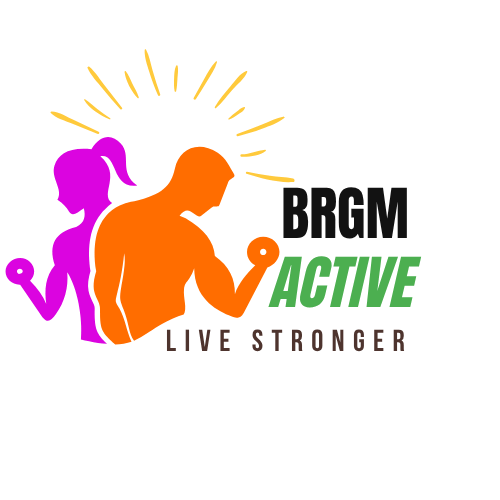plant-based nutrition books for athletes
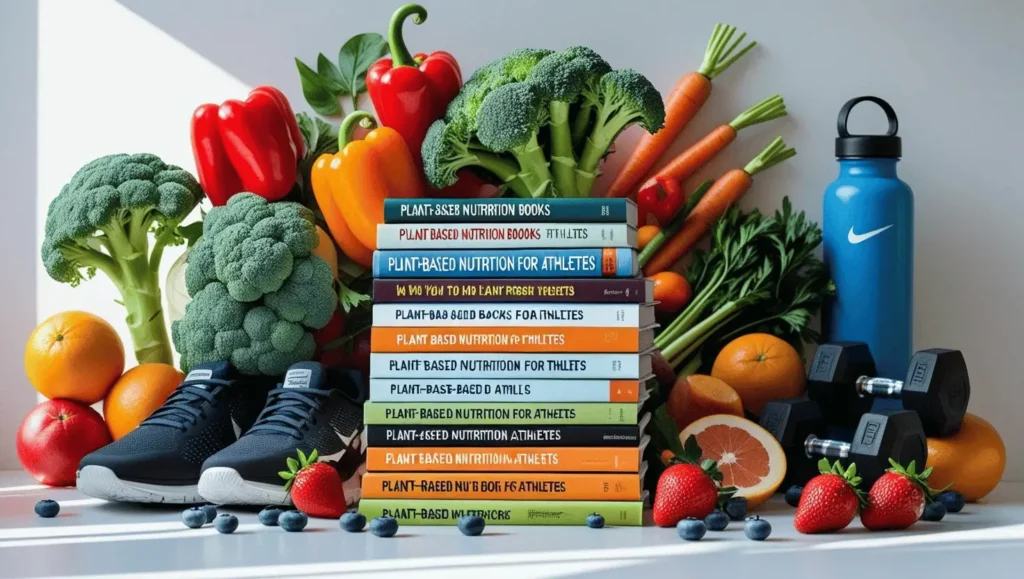
Athletes worldwide are discovering the incredible performance benefits of plant-based nutrition. Whether you’re a weekend warrior or professional competitor, the right plant-based nutrition books for athletes can transform your training, recovery, and overall athletic performance. This comprehensive guide explores the most effective resources to help you master plant-powered nutrition in 2025.
Table of Contents
Why Plant-Based Nutrition Matters for Athletes
Plant-based nutrition has revolutionized athletic performance across all sports disciplines. Recent studies published in the Journal of Sports Medicine demonstrate that athletes following well-planned plant-based diets experience enhanced endurance, faster recovery times, and reduced inflammation markers compared to their omnivorous counterparts.
The plant-based nutrition books for athletes featured in this guide provide science-backed strategies for optimizing your nutrition without compromising performance. These resources address common concerns about protein intake, vitamin B12, iron absorption, and energy availability that many athletes face when transitioning to plant-based eating.
Key Benefits of Plant-Based Athletic Nutrition
- Enhanced Recovery: Plant foods are rich in antioxidants and anti-inflammatory compounds
- Improved Endurance: Complex carbohydrates provide sustained energy release
- Better Digestive Health: Higher fiber content supports optimal gut function
- Reduced Injury Risk: Anti-inflammatory properties may decrease injury occurrence
- Environmental Sustainability: Lower carbon footprint aligns with eco-conscious values
Top 10 Plant-Based Nutrition Books for Athletes
1. “The Plant-Based Athlete” by Matt Frazier and Robert Cheeke
This comprehensive guide stands as the definitive resource among plant-based nutrition books for athletes. Frazier and Cheeke combine decades of athletic experience with cutting-edge nutritional science to create a practical blueprint for plant-powered performance.
Key Features:
- 60+ plant-based recipes designed for athletes
- Detailed meal timing strategies
- Sport-specific nutrition protocols
- Real-world case studies from elite athletes
2. “Eat to Peak” by Maria Hines and Mercedes Pollmeier
Written by a James Beard Award-winning chef and registered dietitian, this book bridges the gap between culinary excellence and athletic performance. The authors provide evidence-based recommendations tailored specifically for endurance athletes.
Highlights:
- Seasonal meal planning approach
- Recovery-focused recipes
- Hydration and electrolyte strategies
- Competition day nutrition protocols
3. “The Game Changers Cookbook” by James Wilks
Following the success of the documentary “The Game Changers,” this cookbook offers practical application of plant-based principles for athletes. Wilks collaborates with professional chefs to create performance-enhancing recipes.
What Makes It Special:
- Recipes from world-class athletes
- Macro-balanced meal options
- Time-efficient preparation methods
- Family-friendly adaptations
4. “Plant-Based Sports Nutrition” by D. Enette Larson-Meyer
As one of the most scientifically rigorous plant-based nutrition books for athletes, this resource combines research-based evidence with practical application. Larson-Meyer’s expertise in sports nutrition shines through detailed explanations of metabolic processes.
Notable Sections:
- Protein requirements and timing
- Micronutrient optimization
- Supplement recommendations
- Performance monitoring strategies
5. “The Plantpower Way” by Rich Roll and Julie Piatt
Ultra-endurance athlete Rich Roll shares his transformation story alongside practical nutrition strategies. This book emphasizes the holistic approach to plant-based living for optimal athletic performance.
Core Themes:
- Whole food, plant-based principles
- Mental performance optimization
- Lifestyle integration strategies
- Long-term sustainability focus
6. “Vegan for Life” by Jack Norris and Virginia Messina
While not exclusively focused on athletics, this book provides essential foundational knowledge for any athlete considering plant-based nutrition. The authors address common nutritional concerns with scientific precision.
Essential Coverage:
- Vitamin B12 and iron absorption
- Calcium and bone health
- Omega-3 fatty acid sources
- Life-stage specific recommendations
7. “The Complete Guide to Sports Nutrition” by Anita Bean (Plant-Based Edition)
This updated edition includes comprehensive plant-based protocols for various sports. Bean’s expertise in sports nutrition translates complex science into actionable strategies.
Valuable Features:
- Sport-specific meal plans
- Training phase nutrition
- Competition preparation protocols
- Recovery optimization techniques
8. “Plant-Based Muscle” by Robert Cheeke
Focused specifically on strength training and muscle development, this book addresses the unique needs of power athletes following plant-based diets.
Strength-Specific Content:
- Protein synthesis optimization
- Creatine and performance supplements
- Muscle recovery protocols
- Bodybuilding meal plans
9. “The Plant-Based Journey” by Lani Muelrath
This book provides a gradual transition approach for athletes new to plant-based eating. Muelrath’s practical strategies help overcome common implementation challenges.
Transition Support:
- Step-by-step implementation
- Common pitfall avoidance
- Social situation navigation
- Long-term adherence strategies
10. “Proteinaholic” by Garth Davis, MD
Dr. Davis challenges conventional protein myths while providing evidence-based recommendations for plant-based athletes. This book offers medical perspective on plant-based performance nutrition.
Medical Insights:
- Protein requirement myths
- Disease prevention benefits
- Hormonal optimization
- Longevity considerations
Essential Nutrients for Plant-Based Athletes
Understanding key nutrients is crucial for athletes using plant-based nutrition books for athletes as their guide. These nutrients require special attention when following plant-based diets:
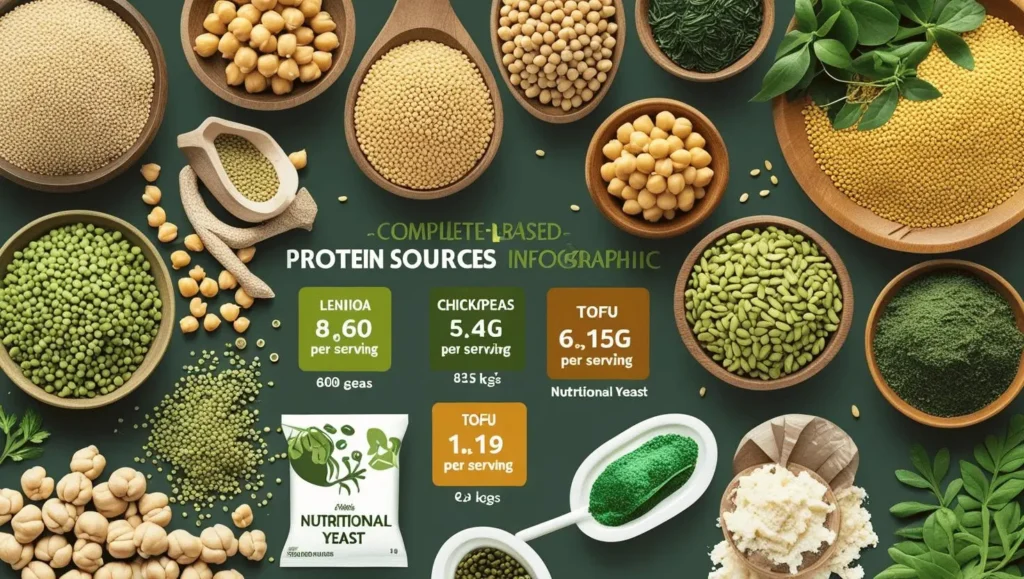
Protein Requirements
Contrary to popular belief, plant-based athletes can easily meet protein needs through diverse food sources. The key lies in consuming adequate calories and including protein-rich plants throughout the day.
Top Plant Protein Sources:
- Legumes (lentils, chickpeas, black beans)
- Quinoa and ancient grains
- Nuts and seeds
- Plant-based protein powders
- Nutritional yeast
Vitamin B12 Supplementation
B12 is the only nutrient that requires supplementation on plant-based diets. Athletes should take 250-500 mcg daily or 2,500 mcg weekly to maintain optimal levels.
Iron Absorption Optimization
Plant-based iron (non-heme) absorbs differently than animal-based iron. Combining iron-rich foods with vitamin C sources enhances absorption significantly.
Iron-Rich Plant Foods:
- Dark leafy greens
- Tofu and tempeh
- Pumpkin seeds
- Dried fruits
- Fortified cereals
Omega-3 Fatty Acids
Essential for inflammation control and recovery, omega-3s come from flaxseeds, chia seeds, walnuts, and algae-based supplements.
Meal Planning and Prep Strategies
The most successful plant-based athletes develop systematic approaches to meal planning and preparation. The plant-based nutrition books for athletes referenced above provide detailed frameworks for meal timing and preparation.
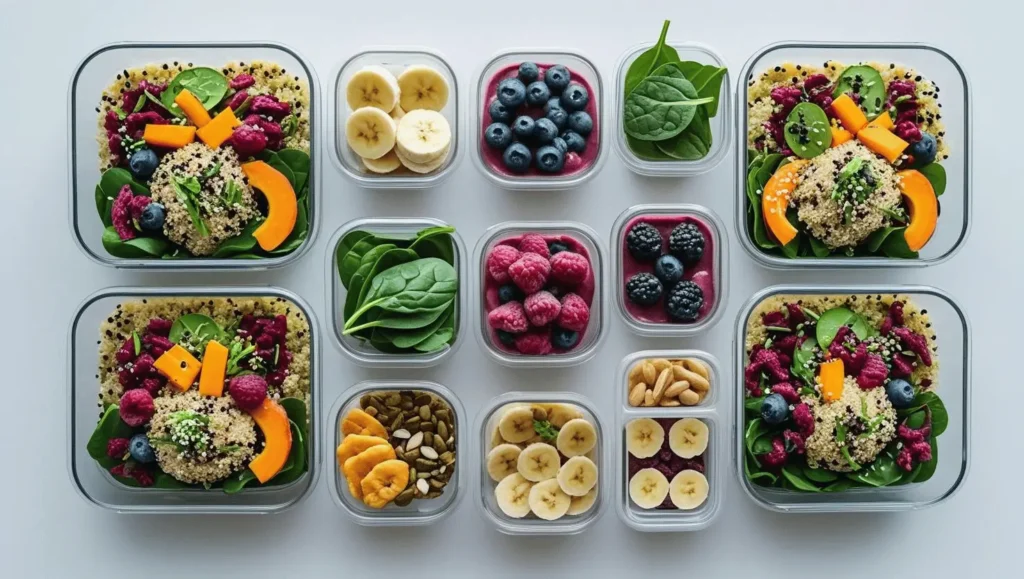
Pre-Workout Nutrition
Focus on easily digestible carbohydrates 30-60 minutes before training:
- Banana with almond butter
- Dates stuffed with nuts
- Oatmeal with berries
- Green smoothie with spinach and fruit
Post-Workout Recovery
Combine protein and carbohydrates within 30 minutes post-exercise:
- Plant protein smoothie with banana
- Quinoa bowl with vegetables
- Hummus with whole grain pita
- Chocolate plant milk with protein powder
Competition Day Protocols
Test all competition day foods during training to avoid digestive issues:
- Familiar carbohydrate sources
- Adequate hydration protocols
- Electrolyte replacement strategies
- Timing optimization
Common Myths About Plant-Based Athletic Performance
Many plant-based nutrition books for athletes address persistent myths that prevent athletes from considering plant-based nutrition:
Myth 1: “You Can’t Get Enough Protein”
Reality: Plant-based athletes easily meet protein needs through diverse food sources. Many plant foods contain all essential amino acids.
Myth 2: “Plant-Based Diets Lack Energy”
Reality: Plant-based diets provide superior carbohydrate availability for sustained energy during training and competition.
Myth 3: “You’ll Become Weak and Frail”
Reality: Numerous elite athletes perform at the highest levels on plant-based diets, including NFL players, Olympic athletes, and ultra-endurance competitors.
Myth 4: “It’s Too Complicated”
Reality: Plant-based eating can be simple and convenient with proper planning and preparation strategies.
Success Stories from Plant-Based Athletes
The plant-based nutrition books for athletes featured in this guide showcase numerous success stories:
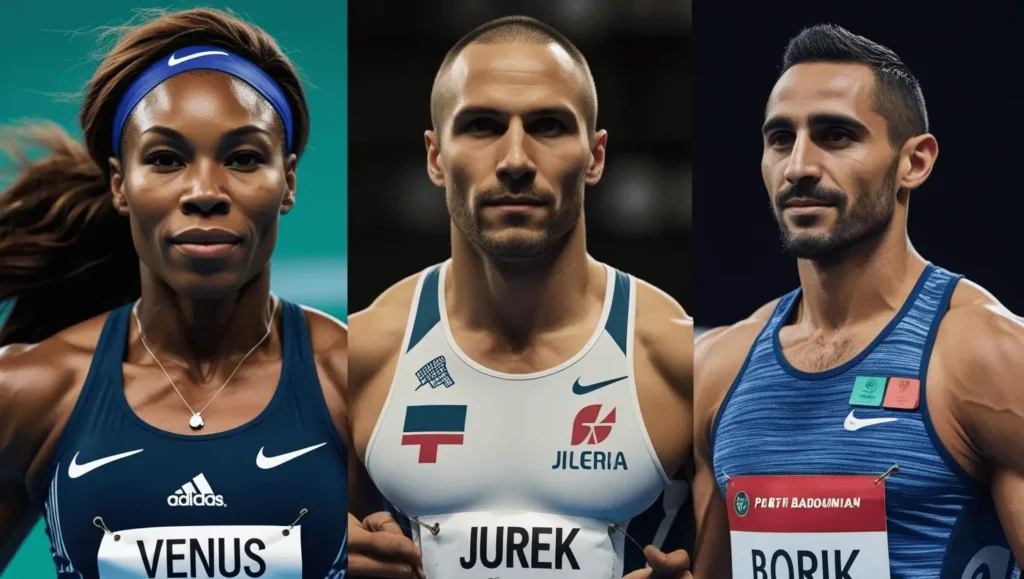
Venus Williams – Tennis Champion
After adopting a plant-based diet to manage autoimmune conditions, Venus Williams continued competing at the highest level of professional tennis.
Scott Jurek – Ultra-Marathon Legend
This ultramarathon champion thrived on plant-based nutrition throughout his record-breaking career, demonstrating the endurance benefits of plant-powered fuel.
Patrik Baboumian – Strongman Competitor
Known as “Germany’s Strongest Man,” Baboumian proves that plant-based nutrition supports even the most demanding strength sports.
Fiona Oakes – Marathon Runner
This marathon world record holder demonstrates that plant-based nutrition supports elite endurance performance across multiple disciplines.
Practical Implementation Tips
Successfully implementing strategies from plant-based nutrition books for athletes requires systematic approaches:
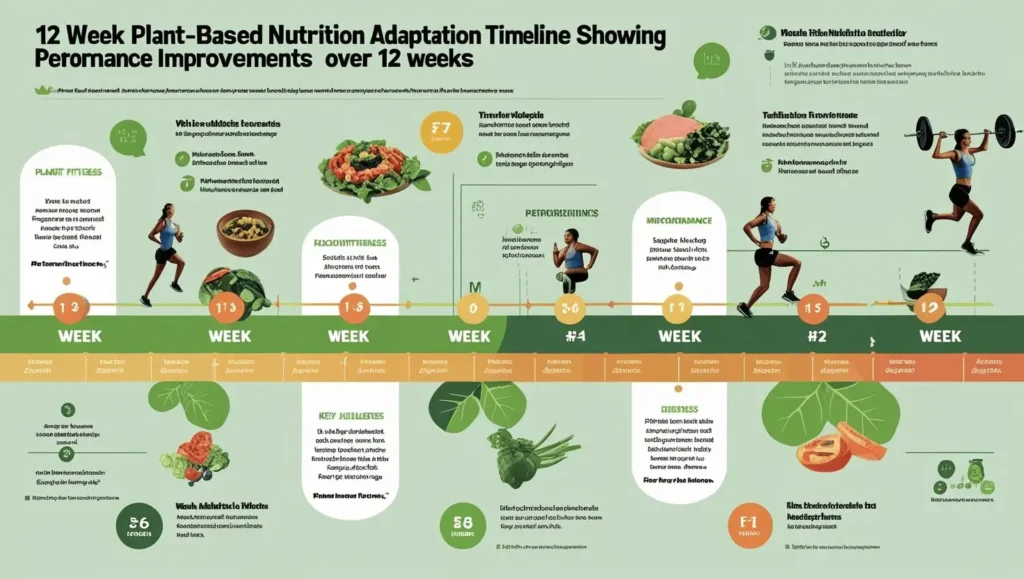
Start Gradually
Begin by replacing one meal per day with plant-based options. This allows your digestive system to adapt while maintaining performance.
Focus on Whole Foods
Emphasize minimally processed plant foods for optimal nutrient density and performance benefits.
Plan Your Meals
Meal planning ensures adequate calorie and nutrient intake while preventing poor food choices during busy training periods.
Track Your Progress
Monitor energy levels, recovery, and performance metrics to optimize your plant-based approach.
Seek Professional Guidance
Consider consulting with a registered dietitian specializing in plant-based sports nutrition for personalized recommendations.
Frequently Asked Questions
Q: How much protein do plant-based athletes need?
A: Plant-based athletes need 1.2-2.0 grams of protein per kilogram of body weight, similar to omnivorous athletes. This requirement is easily met through diverse plant foods.
Q: Are plant-based diets suitable for strength training?
A: Yes, numerous strength athletes thrive on plant-based diets. The key is ensuring adequate calories and protein from diverse sources.
Q: What supplements should plant-based athletes take?
A: Essential supplements include vitamin B12, and potentially vitamin D, algae-based omega-3s, and creatine depending on individual needs.
Q: How long does it take to adapt to plant-based nutrition?
A: Most athletes experience positive changes within 2-4 weeks, with full adaptation occurring over 2-3 months.
Q: Can plant-based athletes compete at elite levels?
A: Absolutely. Many Olympic athletes, professional players, and world record holders follow plant-based diets successfully.
Conclusion and Next Steps
The plant-based nutrition books for athletes featured in this comprehensive guide provide the scientific foundation and practical strategies needed to excel in sports while following plant-based nutrition. Whether you’re seeking enhanced recovery, improved endurance, or sustainable performance, these resources offer evidence-based approaches to plant-powered athletics.
Ready to transform your athletic performance through plant-based nutrition? Start by selecting one of the recommended books that aligns with your sport and goals. Begin implementing strategies gradually, track your progress, and connect with the growing community of plant-based athletes worldwide.
Take Action Today:
- Choose your first plant-based nutrition book from our recommendations
- Schedule a consultation with a plant-based sports nutritionist
- Join online communities of plant-based athletes
- Start meal planning for your next training phase
Remember, the journey to plant-based athletic excellence begins with the first step. These plant-based nutrition books for athletes provide the roadmap – now it’s time to begin your transformation.
Plant-Based Nutrition Research on PubMed
International Society of Sports Nutrition Position Statement
Academy of Nutrition and Dietetics Plant-Based Guidelines
Remember, the journey to plant-based athletic excellence begins with the first step. These plant-based nutrition books for athletes provide the roadmap – now it’s time to begin your transformation toward optimal performance, enhanced recovery, and sustainable athletic success.
Have you read any of these plant-based nutrition books for athletes? Share your experience in the comments below and help fellow athletes on their plant-powered journey! Which book will you start with first?/isolated-segment.html
